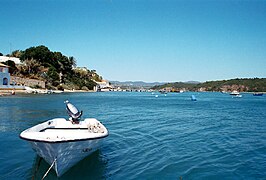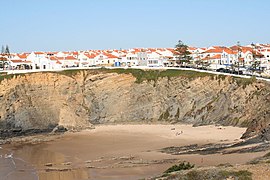Odemira
Odemira | |
|---|---|
 | |
 | |
| Coordinates: 37°35′N 8°38′W / 37.583°N 8.633°W | |
| Country | |
| Region | Alentejo |
| Intermunic. comm. | Alentejo Litoral |
| District | Beja |
| Parishes | 13 |
| Government | |
| • President | Hélder António Guerreiro (PS) |
| Area | |
| • Total | 1,720.60 km2 (664.33 sq mi) |
| Population (2011) | |
| • Total | 26,066 |
| • Density | 15/km2 (39/sq mi) |
| Time zone | UTC+00:00 (WET) |
| • Summer (DST) | UTC+01:00 (WEST) |
| Local holiday | 8 September |
| Website | www |
Odemira (pronounced [ɔðɨˈmiɾɐ] ) is a town and a municipality in Beja District in the Portuguese region of Alentejo. The population in 2011 was 26,066,[1] in an area of 1720.60 km2, making it the largest municipality of Portugal by area.[2]
It is famous for its wild beaches and for being home to a significant Dutch and German community. The village of Zambujeira do Mar is home to the Festival do Sudoeste, one of the biggest rock festivals in Europe.
The municipality of Odemira has great agricultural potential, specially in the western area of the region, and is home to major operations of important agricultural companies like Vitacress, world leader in the salad market.
The present Mayor is Hélder António Guerreiro, elected by the Socialist Party in 2021. The municipal holiday is 8 September.
Geography
[edit]
The municipality of Odemira is located in southwestern Portugal, bordered by the municipalities of Sines and Santiago do Cacém to the north, Ourique to the east, and the Algarvian municipalities of Aljezur and Monchique to the south.
Much of the municipality is within the Southwest Alentejo and Vicentine Coast Nature Park.
Climate
[edit]Odemira has a Mediterranean climate. Winters are mild and rainy, with daytime temperatures usually around 16 °C (61 °F) and nighttime lows around 6 °C (43 °F). Summers are dry and sunny and are hot in the interior of the municipality (maxima is around 31 °C (88 °F) bordering Ourique) and warm at the coast (where maxima is around 25 °C (77 °F)).[3]
| Climate data for Relíquias, 1980-2010, altitude: 244 m (801 ft) | |||||||||||||
|---|---|---|---|---|---|---|---|---|---|---|---|---|---|
| Month | Jan | Feb | Mar | Apr | May | Jun | Jul | Aug | Sep | Oct | Nov | Dec | Year |
| Average precipitation mm (inches) | 57.1 (2.25) |
58.6 (2.31) |
46.0 (1.81) |
54.1 (2.13) |
33.4 (1.31) |
10.5 (0.41) |
2.0 (0.08) |
4.8 (0.19) |
19.2 (0.76) |
80.4 (3.17) |
86.4 (3.40) |
79.1 (3.11) |
531.6 (20.93) |
| Source: Portuguese Environment Agency[4] | |||||||||||||
Parishes
[edit]Administratively, the municipality is divided into 13 civil parishes (freguesias):[5]
- Boavista dos Pinheiros
- Colos
- Longueira / Almograve
- Luzianes-Gare
- Relíquias
- Sabóia
- Santa Clara-a-Velha
- São Luís
- São Martinho das Amoreiras
- São Salvador e Santa Maria
- São Teotónio
- Vale de Santiago
- Vila Nova de Milfontes
Notable people
[edit]- Pedro Damiano (1480–1544) a Portuguese chess player and pharmacist by profession
- Pedro de Almada Pereira (1835 in Odemira – 1911) an Alentejan landowner, schoolmaster and journalist, founded the periodical O Campo de Ourique
Population
[edit]| Odemira Municipality's population (1801–2011) | |||||||||
|---|---|---|---|---|---|---|---|---|---|
| 1801 | 1849 | 1900 | 1930 | 1960 | 1981 | 1991 | 2001 | 2004 | 2011 |
| 6390 | 11 669 | 20 489 | 32 541 | 43 999 | 29 463 | 26 418 | 26 106 | 25 738 | 26 066 |
Gallery
[edit]-
Vila Nova de Milfontes.
-
Vila Nova de Milfontes.
-
Zambujeira.
References
[edit]- ^ Instituto Nacional de Estatística
- ^ "Áreas das freguesias, concelhos, distritos e país". Archived from the original on 5 November 2018. Retrieved 5 November 2018.
- ^ "Monotorização Diária". IPMA. Retrieved 8 January 2022.
- ^ "Monthly Precipitation Relíquias". APA. Retrieved 4 June 2021.
- ^ Diário da República. "Law nr. 11-A/2013, pages 552 81-82" (PDF) (in Portuguese). Retrieved 29 July 2014.
External links
[edit]





